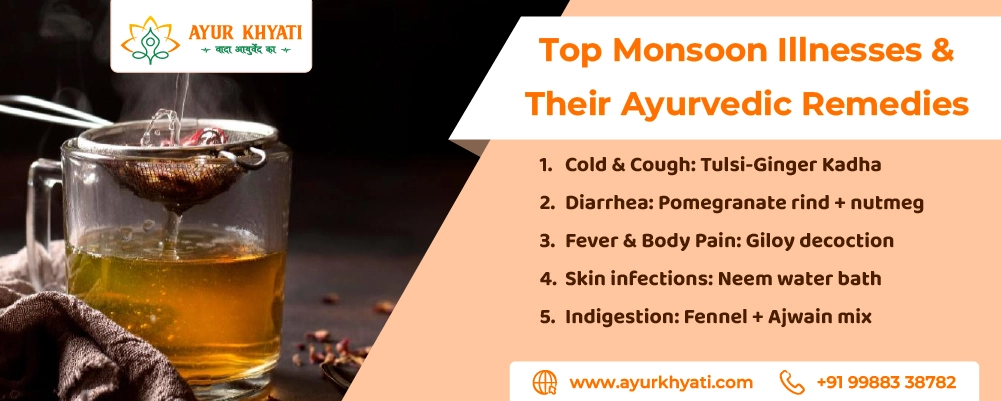Table of Contents
Monsoon season brings refreshing winds and rain. Although it gives relief after summer heat, it also comes with common seasonal illnesses like colds, coughs, fevers and skin infections.
Ayurveda suggests monsoon illness remedies like utilizing herbs that can help you in preventing and treating several common illnesses naturally.
Why Monsoon Affects Health in Gujarat
- Waterborne infections that are caused by drinking dirty water. It increases the risk of diarrhea and other digestive issues.
- Fungal growth: The rainy season provides relief from the summer heat but it also increases moisture in the air. It gives an ideal environment to fungal infections especially in underarms and feet.
- Kapha-Pitta imbalances: As per Ayurveda, Monsoon imbalances the Kapha and Pitta which results in,
- Congestion
- Coughing and cold
- Skin irritation
- Indigestion
Follow these Monsoon health tips in India:
- Drink filtered water
- Avoid eating outside
- Wear loose clothes to prevent fungal infections
- Have light meals
- Consume foods like ginger and garlic to boost immunity

Top Monsoon Illnesses and Their Ayurvedic Remedies
Here are 5 Monsoon illness remedies:
1. Cold & Cough: Tulsi-Ginger Kadha
Tulsi has antibacterial and anti-inflammatory effects, whilst ginger helps to warm the body and cleanse the respiratory tract.
What you need:
1 teaspoon jaggery
1-inch ginger piece
6-7 tulsi leaves
2 cups of water
Usage: Boil tulsi leaves and ginger in water for 10-15 minutes. Add black pepper and jaggery or honey. Drink this Kadha sip by sip when it is warm. It will soothe the throat, reduce coughing and strengthen immunity.
2. Diarrhea: Pomegranate rind + nutmeg
Poor digestion can cause diarrhea and stomach infections in rainy season
Ayurvedic Treatment: Pomegranate Rind and Nutmeg
Pomegranate peel helps in diarrhea management, whilst nutmeg contains antibacterial characteristics that calm the bowels.
Usage: Mix Pomegranate peel powder and pinch of nutmeg powder in warm water and drink once or twice a day.
3. Fever & Body Pain: Giloy decoction
Viral is common during the monsoon season which results in fever, tiredness and body pain.
Ayurvedic Treatment: Giloy decoction
Giloy will help in reducing fever. It boosts the immune system.
Usage: Bring crushed giloy stem to a boil in water until reduced by half. Drink warm once or twice a day.
4. Skin infections: Neem water bath
In Monsoon season, the wet and humid environments encourage bacterial and fungal development. It can cause irritation and skin rashes.
Ayurvedic Treatment: Neem Water Bath
Usage: Boil some neem leaves in water. Add this neem-infused water to your bathwater. It keeps your skin clean and fresh.
5. Indigestion: Fennel + Ajwain mix
As per Ayurveda, The Agni weakens during the monsoon season. It results in gas, bloating, acidity and slow digestion.
Ayurvedic Treatment: Fennel + Ajwain mix
Ajwain enhances digestion and lowers gas, while fennel helps in bloating relief.
Usage: Take an equal amount of roasted fennel and ajwain seeds. Chew a spoonful of the mixture or make it into tea.
Diet and Lifestyle Tips for Monsoon Season
Avoid dairy-heavy or fried foods
As per Ayurveda, heavy, oily or dairy foods will increase Kapha and suppress the digestive fire. It results in bloating and acidity.
What should be consumed:
- Choose for light, warm, and freshly made meals.
- Replace cold milk with warm turmeric milk on occasion.
Add turmeric, ginger, and cloves
Include Immunity boosting spices like Turmeric, ginger, cumin,ajwain and cloves to your diet. These spices will help in improving digestion and prevent stomach infections.
Usage:
- Make herbal teas
- Sprinkle roasted cumin or ajwain on your food
- Mix these spices into your soups or dals

Preventive Practices and Immunity Boosters
1. Daily oil massage:
Before taking a bath, do a self-massage with warm herbal oil. Benefits of daily oil massage:
- Improves blood circulation
- Nourishes the skin and joints
- Calms Vata dosha
- Helps in releasing toxins from the body
2. Nasya:
Nasya means nasal oil application. Add a few (One or two) drops of oil into each nostril on a regular basis.
Benefits of doing Nasal oil application:
- Cleans the nasal passage
- Prevents allergies and infection
- Improves mental clarity
You can use Anu Taila or Shadbindu Taila for doing Nasya.
3. Yoga and pranayama suggestions:
- Yoga Asanas for Monsoon:
- Vajrasana : improves digestion
- Bhujangasana: Strengthens the spine
- Trikonasana : increases metabolism
- Setu Bandhasana: strengthens immunity
- Pranayama Techniques:
- Anulom Vilom: helps in balancing the doshas
- Bhramari : Soothes the nervous system and decreases tension
- Kapalbhati: Improves digestion
Practice yoga and pranayama in the early morning, especially after Nasya.
Conclusion
“During Gujarat’s monsoon, common illnesses like cold, fever, and stomach problems rise”.
Ayurvedic home remedies such as Ayurvedic Kadha for cold, neem water bath for skin infections, giloy for fever or pomegranate and rind for diarrhea are extremely helpful in the monsoon season.
Ayurveda helps you improve your immunity, improves digestion, and maintain your balance throughout the rainy season.
Book our consultation services for more Ayurvedic health tips, natural remedies and seasonal health routines.
You Can Visit The Best Ayurvedic Hospital in India, Ayur Khyati located in Gujarat.
Call: +91 99883 38782